Related Research Articles
"The Wonder of You" is a song written by Baker Knight. It was originally recorded by Vince Edwards in 1958, but this recording has never been released. In an interview with a DJ from Chattanooga, Tennessee, Ray Peterson told the story of how Baker Knight confided that "The Wonder of You" was originally written as a gospel song.

"Way Down" is a song recorded by Elvis Presley. Recorded in October 1976, it was his last single released before his death on August 16, 1977. The song was written by Layng Martine Jr. and recorded by Presley at his home studio in Graceland on 29 October 1976.

"Promised Land" is a song lyric written by Chuck Berry to the melody of "Wabash Cannonball", an American folk song. The song was first recorded in this version by Berry in 1964 for his album St. Louis to Liverpool. Released in December 1964, it was Berry's fourth single issued following his prison term for a Mann Act conviction. The record peaked at #41 in the Billboard charts on January 16, 1965.

"Kentucky Rain" is a 1970 song written by Eddie Rabbitt and Dick Heard and recorded by Elvis Presley. It was recorded at American Sound Studio and features then session pianist Ronnie Milsap. Other musicians on the record include Bobby Wood on piano, Bobby Emmons on organ, Reggie Young on guitar, Tommy Cogbill on bass and Gene Chrisman on drums. The song and session was produced by Felton Jarvis and Chips Moman. It was certified Gold by the RIAA, signifying United States sales of more than a million copies.
"Love Letters" is a 1945 popular song with lyrics by Edward Heyman and music by Victor Young. The song appeared, without lyrics, in the film of the same name released in October 1945. A vocal version by Dick Haymes, arranged and conducted by Young, was recorded in March 1945 and peaked in popularity in September. "Love Letters" was subsequently nominated for the Academy Award for Best Original Song in 1945, but lost to "It Might as Well Be Spring" from State Fair.
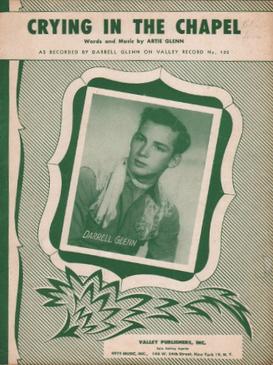
"Crying in the Chapel" is a song written by Artie Glenn and recorded by his son Darrell Glenn. The song was released in 1953 and reached number six on the Billboard chart.
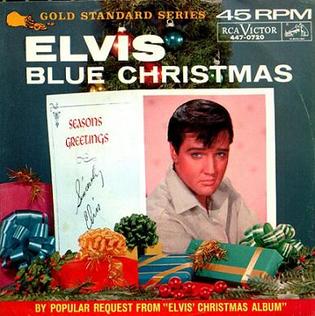
"Blue Christmas" is a Christmas song written by Billy Hayes and Jay W. Johnson and most famously recorded by Elvis Presley, although it was first recorded by Doye O'Dell in 1948. It is a tale of unrequited love during the holidays and is a longstanding staple of Christmas music, especially in the country genre.
"(Now and Then There's) A Fool Such as I" is a popular song written by Bill Trader and published in 1952. Recorded as a single by Hank Snow it peaked at number four on the US country charts early in 1953.
"He'll Have to Go" is an American country and pop hit recorded on October 15, 1959, by Jim Reeves. The song, released in the fall of 1959, went on to become a hit in both genres early in 1960.
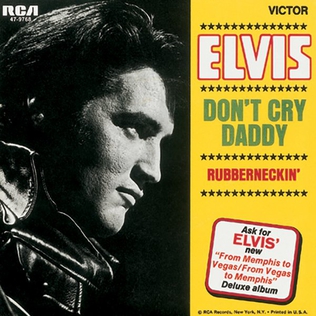
"Don't Cry Daddy" is a 1969 song recorded by Elvis Presley written by Mac Davis. The song was paired with "Rubberneckin'" and both peaked at number six in the United States Billboard Hot 100 chart in January 1970.

"Wear My Ring Around Your Neck" is a song written by Bert Carroll and Russell Moody, performed by Elvis Presley, which was released in 1958. It was particularly notable for breaking a string of ten consecutive number 1 hits for Presley achieved in just two years. Although it was Presley's 6th number-one hit in the American R&B Charts, it only peaked at number 2 on the American Pop Charts.
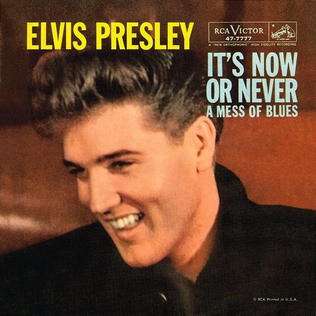
"It's Now or Never" is a song recorded by Elvis Presley and released as a single in 1960. The song is one of the best-selling singles by Presley, and one of the best-selling physical singles of all time. It was recorded by Bill Porter at RCA Studio B in Nashville. It is written in E major and has a tempo of 80 BPM.
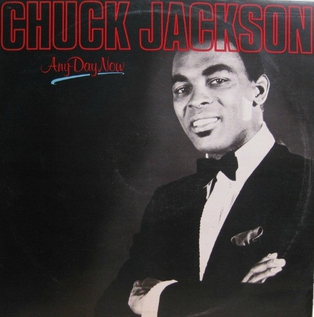
"Any Day Now" is a popular song written by Burt Bacharach and Bob Hilliard in 1962. It has been recorded by numerous artists over the years, including notable versions by Chuck Jackson in 1962, Alan Price in 1965, Elvis Presley in 1969, Scott Walker in 1973 and Ronnie Milsap in 1982. In the lyrics, the singer predicts the imminent demise of a romantic relationship and describes the sadness this will leave.
"My Boy" is a popular song from the early 1970s. The music was composed by Jean-Pierre Bourtayre and Claude François, and the lyrics were translated from the original version "Parce que je t'aime, mon enfant" into English by Phil Coulter and Bill Martin.
"Funny How Time Slips Away" is a song written by Willie Nelson and first recorded by country singer Billy Walker. Walker's version was issued as a single by Columbia Records in June 1961 and peaked at number 23 on the Hot C&W Sides chart. The song has been featured in several live action films and television shows, such as in the first episode of the second season of AMC’s Better Call Saul and in the 2020 Netflix drama The Devil All the Time.
"Last Date" is a 1960 instrumental written and performed by Floyd Cramer. It exemplifies the "slip note" style of piano playing that Cramer made popular. It peaked at number 11 on the country chart and at number two on the Hot 100 behind "Are You Lonesome Tonight?" by Elvis Presley. Cramer's recording inspired a number of successful cover versions, including a vocal adaptation by Conway Twitty.

"Hurt" is a 1954 song by Jimmie Crane and Al Jacobs. "Hurt" was originally performed by Roy Hamilton, whose version peaked at number eight on the R&B Best Seller chart and spent a total of seven weeks on the chart. A version by Ricky Denell also received considerable radio airplay in 1954 on pop radio stations. The song is considered to be the signature hit of Timi Yuro, whose version went to number four on the Billboard pop chart in 1961. Elvis Presley’s 1976 version reached the top 40 on the Billboard Hot 100 and the top 10 on Billboard’s Hot Country Singles chart. Juice Newton's 1985 version scored number one on Billboard's Country chart.

"I Just Can't Help Believing" is a song written by Barry Mann and Cynthia Weil.

The singles discography of Elvis Presley began in 1954 with the release of his first commercial single, "That's All Right". Following his regional success with Sun Records, Presley was signed to RCA Victor on November 20, 1955. Presley's first single with RCA, "Heartbreak Hotel", was a worldwide hit, reaching the No. 1 position in four countries and the top 10 in many other countries. Other hit singles from the 1950s include "Don't Be Cruel", "Hound Dog", "Love Me Tender", "Too Much", "All Shook Up", "(Let Me Be Your) Teddy Bear", "Jailhouse Rock", "Don't", "Hard Headed Woman" and "A Big Hunk o' Love". On March 24, 1958, Presley entered the United States Army at Memphis, Tennessee, and was stationed in Germany. He left active duty on March 5, 1960.

"I Can't Help It (If I'm Still in Love with You)" is a song written and originally recorded by Hank Williams on MGM Records. It hit number two on the Billboard country singles chart in 1951. In his autobiography, George Jones printed the first six lines of the song and stated, "Its lyrics couldn't be more simple - or profound."
References
- ↑ "U.S. Copyright Office Virtual Card Catalog 1955-1970". vcc.copyright.gov. Retrieved 2021-09-09.
- ↑ "classic-country-song-lyrics.com". classic-country-song-lyrics.com. Retrieved February 4, 2021.
- ↑ Whitburn, Joel (2004). The Billboard Book Of Top 40 Country Hits: 1944-2006, Second edition. Record Research. p. 143.
- ↑ Whitburn, Joel (2013). Joel Whitburn's Top Pop Singles, 14th Edition: 1955-2012. Record Research. p. 357.
- ↑ "Jack Greene Chart History (Hot Country Songs)". Billboard.
- ↑ Whitburn, Joel (2004). The Billboard Book of Top 40 Hits: Eighth Edition. Record Research. p. 296.
- ↑ "officialcharts.com". officialcharts.com. Retrieved March 30, 2023.
- ↑ "The Irish Charts - All there is to know".
- ↑ "There Goes My Everything". The Official Charts Company.